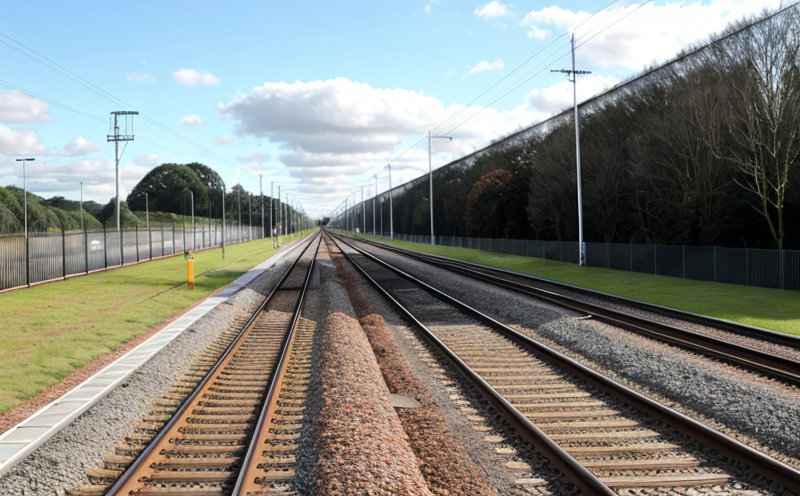EN 13481-7 Fastening System Electrical Insulation Testing
The EN 13481 series of standards provides a comprehensive framework for the testing and quality assurance of railway infrastructure components. Specifically, EN 13481-7 focuses on electrical insulation tests for fastening systems used in railway track and rail infrastructure.
The standard ensures that fastening systems meet stringent requirements to prevent potential electrical hazards and ensure the reliability of the railway system. This is critical given the high voltage environments typically found in modern railway operations.
Fastening systems are essential components for holding rail ties or sleepers securely on the ballast bed, ensuring the stability and safety of the track. Electrical insulation plays a pivotal role as it prevents unintended electrical current from passing through the fastening system to the rail, which could lead to dangerous situations such as short circuits or disruptions in signaling.
The testing process involves several steps aimed at assessing the integrity of the insulating properties of the fastening systems. Specimens are prepared by removing a portion of the fastening system and then subjected to an electrical test where a specified voltage is applied across it. The insulation resistance is measured, and any leakage current or breakdown in the insulation must be within acceptable limits.
This testing method is crucial for ensuring that the fastening systems do not compromise the safety and performance of the railway system. It also supports the overall maintenance schedule by identifying potential weak points early on, allowing for timely repairs and replacements.
The results of these tests are documented meticulously in accordance with EN 13481-7 guidelines to provide a clear picture of the condition of the fastening systems. This documentation is invaluable for quality managers and compliance officers who rely on it to make informed decisions regarding equipment maintenance and replacement schedules.
Our laboratory employs state-of-the-art testing facilities, including specialized equipment designed specifically for these tests. The expertise of our engineers ensures that every test adheres precisely to the requirements set forth by EN 13481-7, delivering accurate and reliable results.
In addition to meeting industry standards, we also provide custom solutions tailored to specific customer needs. Whether it's adapting testing methods for different types of fastening systems or providing additional analysis services, our team is committed to ensuring that every project meets the highest quality and safety standards.
Applied Standards
| Standard Reference | Description |
|---|---|
| EN 13481-7:2015 | This standard provides detailed procedures for electrical insulation tests of fastening systems used in railway track and rail infrastructure. It ensures that the insulating properties are sufficient to prevent unintended electrical current from passing through the system. |
Benefits
The benefits of adhering to EN 13481-7 extend beyond mere compliance; they contribute significantly to enhancing safety and reliability in railway operations.
By conducting rigorous electrical insulation tests, we can identify potential weaknesses or defects in fastening systems before they become operational issues. This proactive approach helps prevent accidents caused by electrical hazards or structural failures due to corrosion or wear and tear.
The tests also serve as a crucial part of the quality assurance process, ensuring that all components meet stringent safety requirements. This not only protects passengers but also contributes to the longevity of railway infrastructure by reducing maintenance costs associated with premature failure.
Furthermore, compliance with international standards like EN 13481-7 enhances the reputation of both suppliers and operators in terms of reliability and safety. It fosters trust among stakeholders and ensures that products meet global best practices.
Our laboratory's expertise in this area positions us as a trusted partner for railway infrastructure companies looking to maintain high standards across their operations worldwide.
Quality and Reliability Assurance
Ensuring quality and reliability is at the core of our services. At [Your Company Name], we implement robust processes to guarantee that all tests conducted meet or exceed specified standards.
We start by selecting appropriate specimens for testing, ensuring they represent typical field conditions as closely as possible. Specimens are prepared according to strict protocols laid out in EN 13481-7, which include cleaning and conditioning procedures to remove any contaminants that might affect test results.
The testing itself is conducted using advanced equipment calibrated to precise specifications. Our engineers monitor all parameters closely throughout the process to ensure accurate measurements. Post-test analysis involves detailed documentation of findings, including calculations and interpretations based on international standards.
We employ a multi-step verification process where results from multiple tests are cross-checked for consistency. This ensures that any anomalies or discrepancies are promptly identified and addressed. The final report includes not only numerical data but also visual aids like photographs of the specimens in various stages of preparation and testing, providing comprehensive insights into the condition of the fastening systems.
Our commitment to quality does not end with individual tests; it encompasses ongoing training for our staff to stay abreast of latest developments in the field. Regular audits are conducted internally to maintain high standards across all aspects of our operations.





